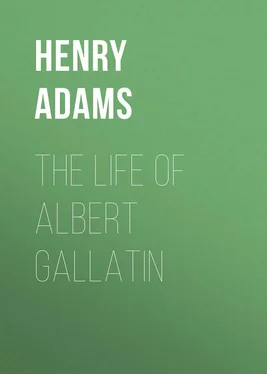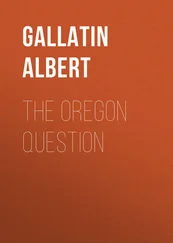Henry Adams - The Life of Albert Gallatin
Здесь есть возможность читать онлайн «Henry Adams - The Life of Albert Gallatin» — ознакомительный отрывок электронной книги совершенно бесплатно, а после прочтения отрывка купить полную версию. В некоторых случаях можно слушать аудио, скачать через торрент в формате fb2 и присутствует краткое содержание. Жанр: foreign_antique, foreign_prose, на английском языке. Описание произведения, (предисловие) а так же отзывы посетителей доступны на портале библиотеки ЛибКат.
- Название:The Life of Albert Gallatin
- Автор:
- Жанр:
- Год:неизвестен
- ISBN:нет данных
- Рейтинг книги:4 / 5. Голосов: 1
-
Избранное:Добавить в избранное
- Отзывы:
-
Ваша оценка:
- 80
- 1
- 2
- 3
- 4
- 5
The Life of Albert Gallatin: краткое содержание, описание и аннотация
Предлагаем к чтению аннотацию, описание, краткое содержание или предисловие (зависит от того, что написал сам автор книги «The Life of Albert Gallatin»). Если вы не нашли необходимую информацию о книге — напишите в комментариях, мы постараемся отыскать её.
The Life of Albert Gallatin — читать онлайн ознакомительный отрывок
Ниже представлен текст книги, разбитый по страницам. Система сохранения места последней прочитанной страницы, позволяет с удобством читать онлайн бесплатно книгу «The Life of Albert Gallatin», без необходимости каждый раз заново искать на чём Вы остановились. Поставьте закладку, и сможете в любой момент перейти на страницу, на которой закончили чтение.
Интервал:
Закладка:
Among the reports enumerated by Mr. Gallatin as those of which he was the author is the following, made by a committee on the 22d March, 1793:
“That they … are of opinion that slavery is inconsistent with every principle of humanity, justice, and right, and repugnant to the spirit and express letter of the constitution of this Commonwealth; therefore submit the following resolution, viz.:
“Resolved, that slavery be abolished in this Commonwealth, and that a committee be appointed to bring in a bill for that purpose.”
A certificate dated “Philadelphia, 3d month, 25th, 1793,” signed by James Pemberton, President, records that Albert Gallatin “is a member of the Pennsylvania Society for promoting the abolition of slavery, the relief of free negroes unlawfully held in bondage, and for improving the condition of the African race.”
1791.Party spirit was not violent in Pennsylvania during these few years of Washington’s first Administration. As yet Mr. Madison was a good Federalist; Mr. Jefferson, as Secretary of State, was the champion of his country against Genet and French aggression; Governor Mifflin was elected without opposition from the Republican interest; Alexander J. Dallas was appointed by him Secretary of State for Pennsylvania; and Albert Gallatin was elected Senator by a Federalist Legislature. Gallatin, who at every period of his life required the spur of sincere conviction to act a partisan part, found in this condition of things precisely the atmosphere most agreeable to his tastes; but there was one political issue which had already risen, and which, while tending to hasten the rapid growth of parties, threatened also to wreck his entire career. This was the excise.
So far as Mr. Gallatin himself was concerned, the tax on whiskey-stills could hardly have been a matter of serious importance, and he must have seen that as a political issue it was not less dangerous to his own party than to the Administration; but he was the representative of a remote border county, beyond the mountains, where the excise was really oppressive and worked injustice, and where the spirit of liberty ran high. Opposition to the tax was a simple matter to Republicans elsewhere; they had merely to vote and to argue, and make what political advantage they might from this unpopular measure into which the Administration was dragged in attempting to follow out the policy of Mr. Hamilton; but the case was very different with Mr. Gallatin. He had not only to lead the attack on Mr. Hamilton, but to restrain his own followers from fatal blunders to which they were only too well disposed; over these followers, at least outside his own county, he had absolutely no authority and very little influence. From the first it became a mere question of policy how far he could go with his western friends. The answer was simple, and left a very narrow margin of uncertainty: Mr. Gallatin, like any other political leader, could go to the limits of the law in opposition to the tax, and no further. His political existence depended on his nerve in applying this rule at the moment of exigency.
The excise on domestic spirits was a part of Mr. Hamilton’s broad financial scheme, and the necessary consequence of the assumption of the State debts. To this whole scheme, and to all Mr. Hamilton’s measures, the Republican party, and Gallatin among them, were strongly opposed. In the original opposition, however, Gallatin had no public share; he began to take a part only when his position as a Representative required him to do so.
The very first legislative paper which he is believed to have drafted is a series of resolutions on the excise, introduced into the Pennsylvania Legislature, by Francis Gurney, on the 14th January, 1791, and intended to affect the bill then before Congress. These resolutions were very strong, and intimated a distinct opinion that the excise bill, as it stood, was “subversive of the peace, liberty, and rights of the citizen,” and “exhibited the singular spectacle of a nation resolutely opposing the oppression of others in order to enslave itself.” Strong as they were, however, the House of Representatives adopted them by a vote of 40 to 16.
The reasons of the peculiar hostility of the western counties to the whiskey tax are clearly given in the petition which Gallatin drafted in 1792 for presentation to Congress on the part of the inhabitants of that country:
“Our peculiar situation renders this duty still more unequal and oppressive to us. Distant from a permanent market and separate from the eastern coast by mountains, which render the communication difficult and almost impracticable, we have no means of bringing the produce of our lands to sale either in grain or in meal. We are therefore distillers through necessity, not choice, that we may comprehend the greatest value in the smallest size and weight. The inhabitants of the eastern side of the mountains can dispose of their grain without the additional labor of distillation at a higher price than we can after we have bestowed that labor upon it. Yet with this additional labor we must also pay a high duty, from which they are exempted, because we have no means of selling our surplus produce but in a distilled state.
1792.“Another circumstance which renders this duty ruinous to us is our scarcity of cash. Our commerce is not, as on the eastern coast, carried on so much by absolute sale as by barter, and we believe it to be a fact that there is not among us a quantity of circulating cash sufficient for the payment of this duty alone. We are not accustomed to complain without reason; we have punctually and cheerfully paid former taxes on our estates and possessions because they were proportioned to our real wealth. We believe this to be founded on no such equitable principles, and are persuaded that your honorable House will find on investigation that its amount, if duly collected, will be four times as large as any taxes which we have hitherto paid on the whole of our lands and other property.”
The excise law was passed in 1791, and in that year a public meeting was held in the town of Washington, and adopted resolutions, one of which brought the remonstrants to the extreme verge of lawful opposition. They agreed to hold no communication with, and to treat with contempt, such men as accepted offices under the law. Mr. Gallatin was not present at this meeting, which was held while he was attending to his duties as a member of the State Legislature.
Few of his letters at this period have been preserved, and of these none have any public interest. During the session of 1792 the following extracts from letters to Badollet are all that have the smallest political importance:
… We have yet done nothing very material, and Congress do not seem to be over-anxious to shorten their sitting, if at least we can form any judgment from the slowness of their proceedings. As to that part of their laws which concerns us more immediately, – I mean the excise and the expected amendments, – all the papers relative to it, petitions, &c., have been referred to the Secretary of the Treasury, Mr. Hamilton, by the House of Representatives. That officer has not yet reported, nor can we guess at what will probably be the outlines of his report, although I am apt to think the amendments he will propose will fall short of our wishes and expectations. As to a repeal, it is altogether out of the question.
But the event which now mostly engrosses the public attention, and almost exclusively claims ours, is the fatal defeat of St. Clair’s army. Our frontiers are naked; the Indians must be encouraged by their success; the preparations of the United States must take some time before they are completed, and our present protection must rest chiefly on the security we may derive from the season of the year and on the exertions of the people and of the State government…
Читать дальшеИнтервал:
Закладка:
Похожие книги на «The Life of Albert Gallatin»
Представляем Вашему вниманию похожие книги на «The Life of Albert Gallatin» списком для выбора. Мы отобрали схожую по названию и смыслу литературу в надежде предоставить читателям больше вариантов отыскать новые, интересные, ещё непрочитанные произведения.
Обсуждение, отзывы о книге «The Life of Albert Gallatin» и просто собственные мнения читателей. Оставьте ваши комментарии, напишите, что Вы думаете о произведении, его смысле или главных героях. Укажите что конкретно понравилось, а что нет, и почему Вы так считаете.












